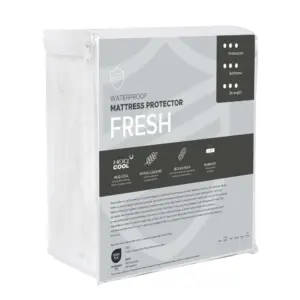Why Do I Sweat in My Sleep? Exclusive Solutions for Better Sleep
If you’ve ever woken up in the middle of the night, drenched in sweat, you’re not alone. This common but discomforting issue, known as night sweats or nocturnal hyperhidrosis, can significantly disrupt your sleep cycle and leave you feeling restless and irritable throughout the day. In this comprehensive guide, we’ll delve into the reasons behind night sweats and offer practical solutions to help you achieve a more restful night’s sleep.
What Are Night Sweats?
Night sweats refer to episodes of excessive sweating during sleep. Unlike typical sweating, which serves to regulate body temperature, night sweats can be so intense that they soak through your pajamas and bedding. This discomfort not only makes it hard to drift back to sleep but can also lead to daytime fatigue and irritability, forming a frustrating cycle of poor sleep.
Decoding Excessive Sweating
Experiencing night sweats means your body is producing more sweat than necessary. Understanding the underlying causes of this phenomenon is crucial for effective management. Let’s explore these common triggers.
Common Causes of Night Sweats
Knowing why you sweat in your sleep is vital for identifying effective solutions. Some prevalent causes include:
Hormonal Changes
Hormonal fluctuations are one of the leading contributors to night sweats, especially for women undergoing menopause or perimenopause. As estrogen and progesterone levels fluctuate, your body’s temperature regulation can get thrown off balance, resulting in excessive sweating. Hormonal disorders like hyperthyroidism can also play a significant role in this discomfort.
Medications
Certain medications are notorious for increasing night sweating. For instance, selective serotonin reuptake inhibitors (SSRIs), commonly prescribed for depression, can interfere with how your body regulates temperature. Other medications to watch out for include:
– Antihistamines
– Fever-reducing drugs
– Steroids
If you suspect your medication might be the culprit, it’s advisable to discuss this with your healthcare provider.
Infections
Various infections can trigger night sweats as your immune system responds to the pathogen. Common illnesses like the flu or COVID-19 often come with fever and sweating. More severe infections, such as tuberculosis or HIV, could also present night sweats as a symptom.
Anxiety and Stress
Emotional stress can have a profound impact on your body’s physiology, sometimes manifesting as night sweats. When you’re anxious or stressed, your body can behave as if it’s facing a danger, even while you’re asleep.
Optimizing Your Sleep Environment
Your sleep environment is instrumental in determining the quality of your sleep and the frequency of night sweats. Here are some aspects to consider for creating a more conducive sleep environment:
Temperature Control
Maintaining a cooler room can significantly improve your comfort level while sleeping. Aim for a room temperature around 65 degrees Fahrenheit. If the room is too warm, your likelihood of experiencing night sweats increases.
Bedding and Sleepwear
The type of bedding and clothing you choose can greatly affect your comfort. Heavy blankets can trap heat, so it’s wise to opt for lightweight, breathable bedding. Additionally, steer clear of synthetic fabrics like polyester that can retain heat. Instead, go for moisture-wicking materials such as cotton or bamboo, which help keep you cool and dry throughout the night.
Quick Tips for Staying Cool
– Cool Down Your Room: Use a fan or the air conditioning to enhance airflow.
– Lightweight Bedding: Choose breathable sheets and ditch heavy blankets when possible.
– Breathable Sleepwear: Consider wearing loose-fitting pajamas made from light, breathable fabrics to allow air circulation.
When to Seek Medical Help
While occasional night sweats may be benign, persistent episodes combined with other concerning symptoms warrant professional evaluation. Be alert for these red flags:
– Unexplained Weight Loss: This could indicate a serious underlying medical condition.
– Frequent Night Sweats: Continuous episodes over weeks should prompt a conversation with your healthcare provider.
– Disturbed Sleep Quality: If your night sweats are severely affecting your sleep quality, an evaluation is in order.
Underlying Medical Conditions
Several health issues can manifest through night sweats, including autoimmune diseases, cancers, and cardiovascular problems. Proper diagnosis and treatment are crucial to addressing any underlying conditions that may be contributing to this issue.
Effective Ways to Manage and Prevent Night Sweats
Managing night sweats often involves a combination of lifestyle changes and possibly medical interventions.
Lifestyle Adjustments
– Maintain a Cool Bedroom: Ensure good ventilation and keep your sleeping area cool.
– Invest in Breathable Bedding: Opt for moisture-wicking and lightweight materials.
– Limit Known Triggers: Try to avoid spicy foods, caffeine, and alcohol in the evening.
Hormonal Therapy
For individuals whose night sweats stem from hormonal imbalances, discussing options like hormone replacement therapy (HRT) with your physician may be beneficial.
Stress Reduction Techniques
Incorporating relaxation methods such as mindfulness meditation, deep-breathing exercises, or gentle yoga can significantly alleviate anxiety-related night sweats.
Frequently Asked Questions About Night Sweats
What Does It Mean if You Sweat in Your Sleep?
Nighttime sweating can suggest your body is attempting to cool down due to environmental factors, non-breathable bedding, or underlying health conditions.
Why Do I Sweat in My Sleep in a Cold Room?
Even in cooler environments, heavy bedding or specific health conditions can lead to night sweats. Improving airflow can help mitigate this issue.
When Should Night Sweats Raise Concern?
Persistent night sweats, particularly when associated with unexplained weight loss or fever, may indicate a serious health issue and should prompt a medical consultation.
Conclusion
Understanding why you sweat in your sleep is the first step toward finding effective relief. By addressing both environmental factors and any underlying health conditions, you can significantly enhance your sleep quality. Your path to restful, uninterrupted nights is not only achievable—it’s within your control. Explore the solutions available, and take proactive steps to reclaim your sleep health for a more refreshing night’s rest.













